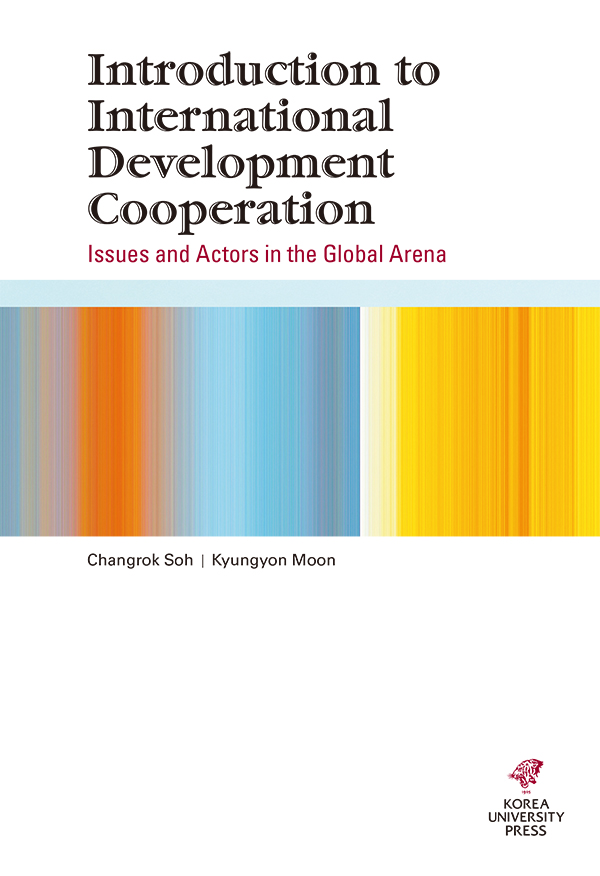우리나라는 2010년 선진 공여국 그룹인 경제협력개발기구(OECD) 개발원조위원회(DAC)의 24번째 회원국이 되었다. 한국전쟁 직후 세계 어느 나라보다도 많은 원조를 받던 우리나라는 역사상 수원국에서 순수 공여국이 된 최초의 국가로서의 자긍심으로 원조 규모를 확대하고 있는 한편, 원조의 양적, 질적 선진화를 위해 많은 노력을 기울이고 있다. 우리나라를 포함해 많은 나라의 정부와 민간이 저발전국가에 대한 원조를 꾸준히 늘려가고 있고 유엔 및 여타 국제기구들이 국제사회에서 빈곤퇴치, 보편교육 등의 지속가능발전 어젠다를 계속해서 내놓아 국제개발협력학에 대한 관심이 급증하고 있지만, 이들 국가들의 개발을 돕는 전문가와 이 분야를 공부하려는 학생들을 위한 적당한 입문서를 찾기가 쉽지 않았다. 국제개발협력이라는 분야가 경제학, 정치학, 행정학, 사회학, 교육학, 보건학 등 여러 다양한 학문 분야에 걸쳐 얽혀 있는 질문들을 탐구하는 학문이기 때문일 것이다. 마땅한 개론서가 없다 보니 국내 대학과 기관은 물론 해외 대학들도 학부와 대학원 교육을 주제마다 필요한 논문이나 유엔 보고서에 의존해 왔다.
이 책은 국제개발협력에 관심을 갖는 학부생 혹은 대학원생들을 위한 책으로 국제개발협력 분야의 주요 쟁점, 행위자, 문제해결방식, 갈등과 협력의 상호작용 등을 다루어 국제개발협력 분야에 대한 일반적인 이해를 돕는 것을 목적으로 하고 있다. 이 책은 첫째로 해외 원조가 진전되어 온 역사를 제2차 세계대전이 끝난 시점부터 살펴봄으로써 원조 공여국과 수원국의 관계를 보다 잘 이해할 수 있도록 하며, 둘째로 지난 50여 년 동안 개발원조를 실행해 온 국제사회의 공동의 노력을 평가하고 지속가능발전 어젠다가 시작된 2015년 이후 앞으로 맞게 될 도전이 무엇인지 밝히고자 한다. 보다 효과적인 방식으로 저개발국을 지원하려는 국제 사회의 노력이 많은 긍정적인 결과를 낳았지만 빈곤 퇴치 및 많은 지구적 과제를 수행하기 위해서는 아직도 극복해야 할 장애가 많이 있다. 마지막으로, 이 책은 점점더 다양한 행위자들이 개발원조에 참여하게 되고 개발의 문제가 점점더 광범한 영역의 복잡한 문제들과 연관됨에 따라 개발 원조의 범위가 점점 넓어져 왔음을 지적하며, 앞으로 저개발국을 보다 효과적으로 지원하기 위해서는 다양한 행위자들이 협력적인 네트워크를 만들고 지구적 거버넌스 체제를 구축하는 일이 중요함을 강조한다.
이 책은 영어로 쓰였는데 그 이유는 첫째, 국제개발협력이 해외에서 이루어지는 사업영역으로 핵심적 용어나 이론이 영어권에서 생겨났고 실무 역시 영어로 이루어지기 때문에 학습 역시 영어로 이루어질 때 전문성을 확보하기 용이하기 때문이다. 둘째, 특히 국제대학원과 각종 기관에 개도국 학생들이 점점더 많이 찾아오는데 한국의 발전 경험에 기반한 개발협력 모델에 대해 배우고자 해도 이들을 위한 기초 교재가 없어 이들을 위해서도 한국어보다 영어로 된 교재가 더 유용할 것이다.
따라서 이 책은 국제개발협력 분야의 다양한 행위자, 원조 형식, 국제 규범, 지속가능발전계획을 비롯한 새로운 접근 방법 등 이 분야에 입문하는 국내외 학생, 현장전문가, 정책결정자가 알아야 할 국제개발협력 분야의 가장 핵심적인 내용과 관련된 이슈별 쟁점들을 소개함으로써 이 분야의 기본 지식을 전할 뿐 아니라 비판적 사고를 기르는 데에도 기여할 것으로 기대된다.
Chapter 1. Theoretical Perspectives of Foreign Aid
1.1 Traditional Perspectives
1.2 Non-Traditional Perspectives
1.3 Governance for Global Public Goods
Chapter 2. Evolution of Aid: Origin and History
2.1 Evolution of Foreign Aid
2.2. From OEEC DAG to OECD DAC
2.3 New Objectives of Aid
2.4 Millennium Development Goals (MDGs)
2.5 Post-2015 and Promoting Global Cooperation
Chapter 3. Aid Planning and Monitoring
3.1 Aid Planning
3.2 Types of Aid
3.3 Monitoring and Evaluation
Chapter 4. Foreign Aid and Official Development Assistance (ODA)
4.1 Poverty Alleviation and Aid
4.2 Definition of ODA and Other Relevant Terms
4.3 Success Cases of ODA
4.4 OECD DAC Member Countries
4.5 Emerging Donors: China, Brazil, Russia and India
Chapter 5. Bilateral, Multilateral and Multi-bi Aid
5.1 Bilateral Aid
5.2 Multilateral Aid
5.3 Multi-bi Aid
Chapter 6. NGOs in International Development Cooperation
6.1 Non-Governmental Organizations (NGOs)
6.2 NGOs in the Field of Development
6.3 Transnational Networks
6.4 Dynamics of NGOs Operation
Chapter 7. Private Sector & Public-Private Partnership (PPP)
7.1 Private Sector
7.2 Foreign Direct Investment
7.3 Promoting Private Investments
7.4 Public Private Partnerships
7.5 Private Sector Contributions to Governance
Chapter 8. Aid Effectiveness
8.1 Increasing Aid Effectiveness
8.2 DAC Principles for Effective Aid
8.3 The 4th High Level Forum on Aid Effectiveness in Busan
8.4 Global Aid Harmonization Mechanism
Chapter 9. Poverty, Security and Human Rights
9.1 Pro-poor Development for Poverty Eradication
9.2 International Security
9.3 Human Security
9.4 Human Rights and Development
9.5 Regional Human Rights Efforts
9.6 Rights to Security
Chapter 10. Sustainable Development and Green Growth
10.1 Growth, Environment and Sustainable Development
10.2 Climate Change and Poverty
10.3 Environmental Aid
10.4 Sustainable Development Goals (SDGs)
Chapter 11. Aid for Trade (AfT)
11.1 Concept and Mechanism of Aid for Trade (AfT)
11.2 Cases of Successful AfT
11.3 Major Actors in AfT
11.4 For Better AfT
Chapter 12. Policy Coherence for Development (PCD)
12.1 Evolution of PCD
12.2 Mechanism of PCD
12.3 PCD in Peer Review
Chapter 13. Global Aid Architecture
13.1 A New Global Order
13.2 Fragmented Networks
13.3 Limitations of DAC
13.4 Global Governance of Aid
13.5 Aid Mechanisms and Donor-Recipient Relations
Chapter 14. International Norms and Lessons Learned
14.1 Building Blocks: 12 Lessons from DAC Peer Review
14.2 Good Humanitarian Donorship
14.3 Code of Conduct and Sphere Project
14.4 Global Commitments to Better Aid
저자 : 서창록Changrok Soh
Professor, Korea University Graduate School of International Studies Member, United Nations Human Rights Council Advisory Committee Director, Korea University Human Rights Center President, Human Asia... more
저자 : 문경연Kyungyon Moon
Assistant Professor, Jimmy Carter School of International studies, Chonbuk National University Researcher, Northeast Asia Development Research Center, The Export-Import Bank of Korea Research Professor, Graduate School of International Studies, Korea University Professional Researcher, Institute for Poverty Alleviation and International Development, Yonsei University... more





